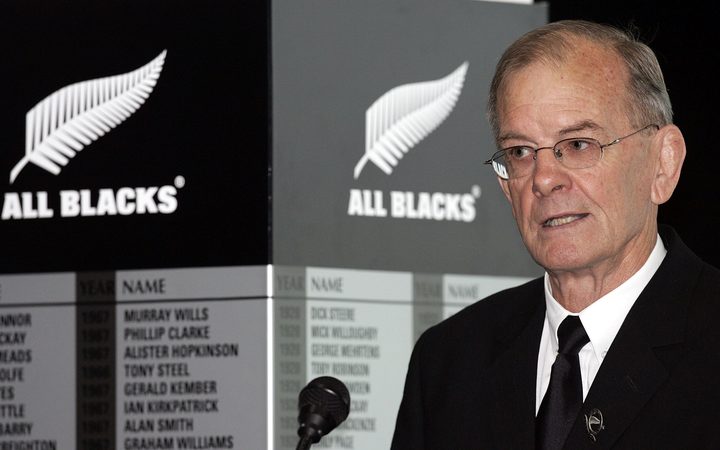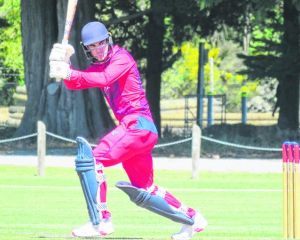
Can we open the books with a quintessentially Christchurch question: What school did you go to?
Linwood High School.
That’s in the zone where the family settled isn’t it?
Granny Garland came out on the sixth ship. She came over the Port Hills, got down into Hillsborough and says ‘I’m absolutely buggered, I’m not going any further’. They parked up by the river where the old Woolston railway station used to be and ended up buying some land. They put the driveway down to what was Opawa Rd in those days and that became Garlands Rd.

I was there from 1968 to 1973. The guy that turned me to teaching most of all was (former All Black captain) John Graham. He taught me history and brought it to life with stories, humour. It wasn’t all grinding out textbooks, dates, kings and queens and all that.
Was the late Sir John Graham a tough taskmaster?
There was one lovely moment. We played a staff and pupils cricket match. He was batting pretty comfortably so I dropped one in short to give him a hurry up and it hit him on the chest. A few balls later I got him out because he was hanging on the back foot. On Monday morning he came into class and said ‘Garland, you bastard’. He undid his shirt and there was the perfect upright stitching of the cricket ball.
Were they any repercussions?
No, what happened on the field, stayed on the field.

Average. I had to work pretty hard to achieve but that set me up in life nicely.
What steps did you take to return to the classroom after leaving school with a bursary?
You basically got sponsored to go through uni. I finished my BA and did my year of teacher training in 1977. The following year I went back and did an MA.
How did you secure a position at SBHS in February, 1979?
It was day one of the test (against Pakistan) at Lancaster Park. At the first break in play, the tannoy crackles into life: ‘If Steve Garland’s in the ground can he phone home urgently’. They were light one teacher in social science and a teacher had heard of me. Another teacher overheard this and his mother worked with my wife. She got Noeline out of a meeting and she had the gumption to call Lancaster Park. I phoned the school and said ‘I’m down at the cricket’. They said come along so I had my first interview in shorts, t-shirt and jandals. It was a one-year appointment and then it became a permanent one.
After your casual attire at the interview you certainly made an effort to look the part didn’t you?
I tried to make a big impression and get involved in coaching rugby and cricket. I was coaching the 1st XI by the end of the first year.

We went through a phase when we were the dominant school in Christchurch. Those teams had (future test players) Darrin Murray, Michael Papps, Nathan Astle, Craig McMillan and Gary Stead. Richard Petrie played one-dayers. Those guys were pretty dominant from the start but you’d like to think you added one or two per cent to their development.
Your specialist subject was, and still is, social studies. How has that evolved over the years?
One of the nice things is we’ve had an increasing emphasis on Maori history. When they (the Ministry of Education) wanted to make sure there was Maori content in New Zealand history last year they gave a range of examples of what we should be looking at. We already did 95 per cent of it in one form or another. We’d moved a bit with the times to hopefully make the subject more relevant for boys. In year 12 we do a trip to Akaroa and look at British, French and Maori history over there. In fifth form history we used to look at New Zealand’s social welfare development; The New Deal (USA) was the other example. It’s not something the boys got into too much.
You started out teaching with chalk and a blackboard. How tough has it been adapting to new technology?
Yep, chalk and the blackboard . . . handouts from the old Banda machine. The first thing they’d do is sniff the methylated spirits. Then we progressed to overhead transparencies. By the late 1980s we had one television on a trolley with a VHS machine. Prior to that you used to have to take them down to the movie theatre and you’d go through the National Film Library and get 8mm films.
Now of course everything is on the computer. I haven’t bought a history textbook for four years. Nowadays the kids have several ways to find information. The History Channel has been really good in that regard. By reenacting stuff the boys can see it rather than read about it.
The mode of delivering lessons may have changed but the basic tenets of teaching are still the same aren’t they?
Yes, and that’s the vital thing, interacting with the kids in the classroom. It’s so easy to sit at your pedestal at the front, set the stuff up, explain what you need them to do and not move from there. The old interface with the students isn’t as strong as it used to be.
There’s some ‘Quiet Please’ signs up around the campus. Is this the most stressful time of the year with exams?
That’s one of the problems with NCEA. A number of students do credit counting and by this time of the year they’ve already got enough credits to pass so they’ll say ‘I don’t need to worry about the exam’. The conscientious kids will but the majority, as soon as they’ve got the number of credits, that’s it. That’s got to be an issue for their work ethic when they leave school.
Are students more – or less – respectful these days?
The kids (today) are cheekier, they’re more confident. They’re taking less responsibility for their own actions. In the days of old, if they were kicking a ball around and smashed a window at lunchtime the boys would own up. Nowadays if something like that happens they’ll run a mile and hope they don’t get caught.
Did you ever use the cane before it was outlawed by SBHS in the early 1980s?
Only once. I had a fifth form class for a study period and they weren’t interested so we worked out a deal that whatever you did, you didn’t disturb anyone else. This kid pushed and pushed so I gave him a page of lines. He hadn’t done them so it doubled. Then it went up to four pages.
I gave him one (strike) for the original punishment and two for stuffing me around. I made a good enough job of it to make sure he spread the message: “Don’t get caned by Garland”. It’s not a pleasant experience. There were teachers who’d thrash kids for very little. That was part of the problem. It was misused.
After the February 22, 2011, earthquake SBHS entered a timeshare at Papanui High School. How did that pan out?
We did the afternoon shift, I really enjoyed it. They got the school (SBHS) all set up and then we had the June (2011) quake so they were back to square one again. We finally got back on site that September.
Ultimately SBHS moved to a new complex alongside the similarly relocated Avonside Girls’ High School in New Brighton last year. Do you miss anything about the original location on North Parade? It must have felt like a second home.
To an extent. But those old H-block designs, they were tired buildings. There were prefabs all over the place as the school roll was expanding. That was one of the pluses coming here . . . modern building, fresh environment.
You negotiated the earthquakes and then Covid-19 posed a new obstacle to school-based learning? How difficult was it to teach during lockdown?
In social sciences it wasn’t that difficult because our whole course was on the computers. All the resource material was there for the boys to work their way through but you had to accept some felt quite uncomfortable. There’d be large families with one computer, taking turn about.
Is doing your homework still an imperative?
Increasingly I’ve found homework has become a thing of the past. You find a lot of kids get part-time jobs after school. Some of the boys need those jobs to support their family. During Covid they couldn’t do the school work because mum or dad had lost their job, or both. I don’t think we cover anywhere near as much content in a year to what we used to either. We can cover everything in class time without much difficulty.
Have any of your former students graduated into teaching?
Oh, yes. Tim Grocott is an old boy of mine, he’s the current principal. He’s politely said I was one of the reasons he went into teaching. I also taught Dave Grocott, his older brother. There’s been a few of them.
Were you ever tempted to switch schools?
Every time you thought ‘I need to look for opportunities’ opportunities cropped up here. I ran night classes for a while, I did careers advising for a while. I got head of department (social studies) and history.
Will you be content when that end of period bell sounds for the last time?
Yes. I’ve found over the last couple of years I’ve started to get increasingly intolerant and less patient with stupidity and immaturity. I started to think ‘You’re not the old patient bugger that you used to be Steve, it’s time you started to think about moving on’.”
So what after-school activities do you have planned?
We’ve got a 40-foot yacht up in the Sounds. My wife and I were going to do some overseas travel but that’s off the books now. We bought ourselves a campervan so we’re going to do the old ‘grey nomad thing’ and wander around the country.













